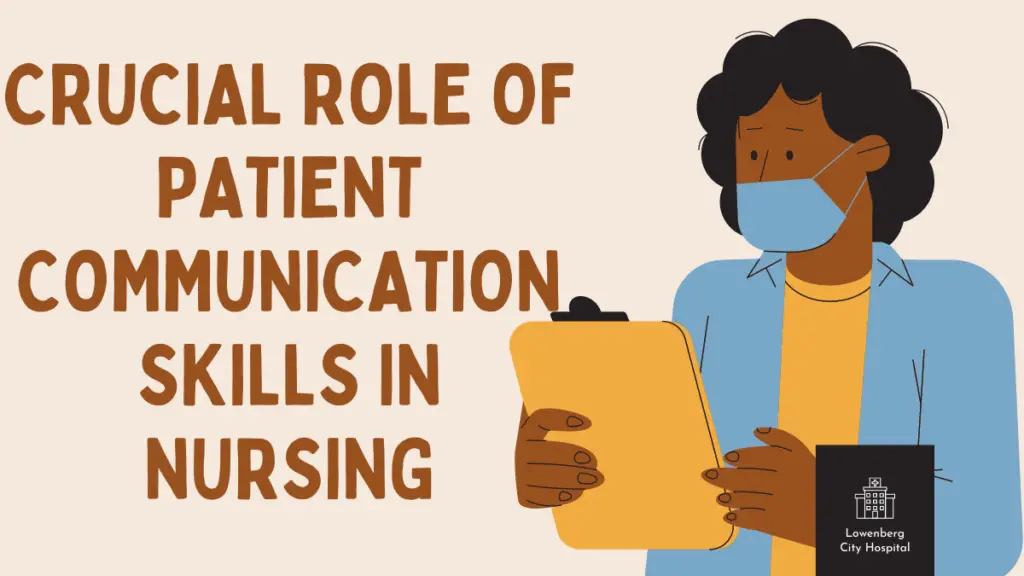In the realm of healthcare, effective communication between nurses and patients holds paramount importance. Patient communication skills encompass a wide array of verbal and non-verbal techniques that nurses employ to interact with patients, families, and colleagues. This article delves deep into the significance of patient communication skills in nursing practice, elucidating their impact on patient outcomes, satisfaction levels, and overall quality of care.
Understanding Patient Communication Skills
Definition and Scope
Patient communication skills refer to the ability of nurses to convey information, listen attentively, empathize, and establish rapport with patients. These skills are vital for fostering trust, promoting understanding, and addressing patient needs comprehensively.
Components of Effective Communication
Effective communication in nursing comprises verbal communication, non-verbal cues, active listening, empathy, and cultural competence. Nurses must adeptly navigate through these components to ensure clear, respectful, and meaningful interactions with patients from diverse backgrounds.
Table: Impact of Effective Nurse-Patient Communication
| Outcome | Impact |
|---|---|
| Patient Satisfaction | Higher satisfaction levels, improved patient experience |
| Clinical Outcomes | Better adherence to treatment plans, reduced readmission rates |
| Patient Safety | Fewer medical errors, enhanced safety culture |
| Collaborative Relationships | Stronger nurse-patient rapport, increased trust |
| Healthcare Efficiency | Streamlined workflows, improved resource utilization |
The Importance of Patient Communication Skills
Enhancing Patient Outcomes
Research indicates a strong correlation between effective nurse-patient communication and positive health outcomes. Patients who feel heard and understood are more likely to adhere to treatment plans, report symptoms accurately, and participate in shared decision-making processes, ultimately leading to better clinical outcomes.
Improving Patient Satisfaction
Patient satisfaction is intricately linked to the quality of interpersonal interactions during healthcare encounters. Nurses who demonstrate excellent communication skills contribute significantly to patient satisfaction by addressing concerns promptly, providing emotional support, and fostering a collaborative environment where patients feel valued and respected.
Reducing Medical Errors
Clear communication among healthcare team members and between nurses and patients is instrumental in preventing medical errors. Misunderstandings or inadequate information exchange can lead to medication errors, misdiagnoses, or treatment delays. Effective communication ensures that critical information is conveyed accurately, mitigating the risk of adverse events.
Enhancing Patient Safety
Patient safety hinges on effective communication practices within healthcare settings. Nurses play a pivotal role in promoting safety by effectively communicating with patients about their medications, procedures, and potential risks. Moreover, open communication channels facilitate the early identification of safety concerns, allowing for timely interventions and preventive measures.
Strategies for Improving Patient Communication Skills
Active Listening Techniques
Active listening entails fully concentrating on what the patient is saying, acknowledging their feelings, and providing appropriate responses. Nurses can hone their active listening skills by maintaining eye contact, nodding affirmatively, paraphrasing, and asking clarifying questions.
Empathy and Compassion
Empathy involves understanding the patient’s perspective, validating their emotions, and demonstrating genuine concern for their well-being. Nurses can cultivate empathy by putting themselves in the patient’s shoes, acknowledging their fears and anxieties, and offering words of comfort and reassurance.
Cultural Competence
Cultural competence encompasses awareness, sensitivity, and respect for the cultural beliefs, values, and practices of diverse patient populations. Nurses should strive to understand the cultural nuances that influence communication preferences and tailor their approach accordingly to foster trust and mutual understanding.
Effective Patient Education
Patient education is an integral aspect of nursing practice, empowering patients to make informed decisions about their health and well-being. Nurses should employ clear, jargon-free language, utilize visual aids when appropriate, and encourage patient participation to ensure comprehension and retention of information.
The Role of Technology in Patient Communication
Advancements in healthcare technology have revolutionized patient communication, offering innovative tools and platforms to enhance interaction and engagement. Electronic health records (EHRs), patient portals, telehealth services, and mobile applications enable seamless communication between nurses and patients, facilitating timely access to information, remote monitoring, and virtual consultations.
Conclusion
In conclusion, patient communication skills are indispensable for delivering high-quality, patient-centered care in nursing practice. Nurses who excel in communication possess the ability to forge meaningful connections, facilitate therapeutic relationships, and promote positive health outcomes. By honing their communication skills and embracing innovative technologies, nurses can elevate the standard of care and ensure optimal experiences for patients across diverse healthcare settings.

